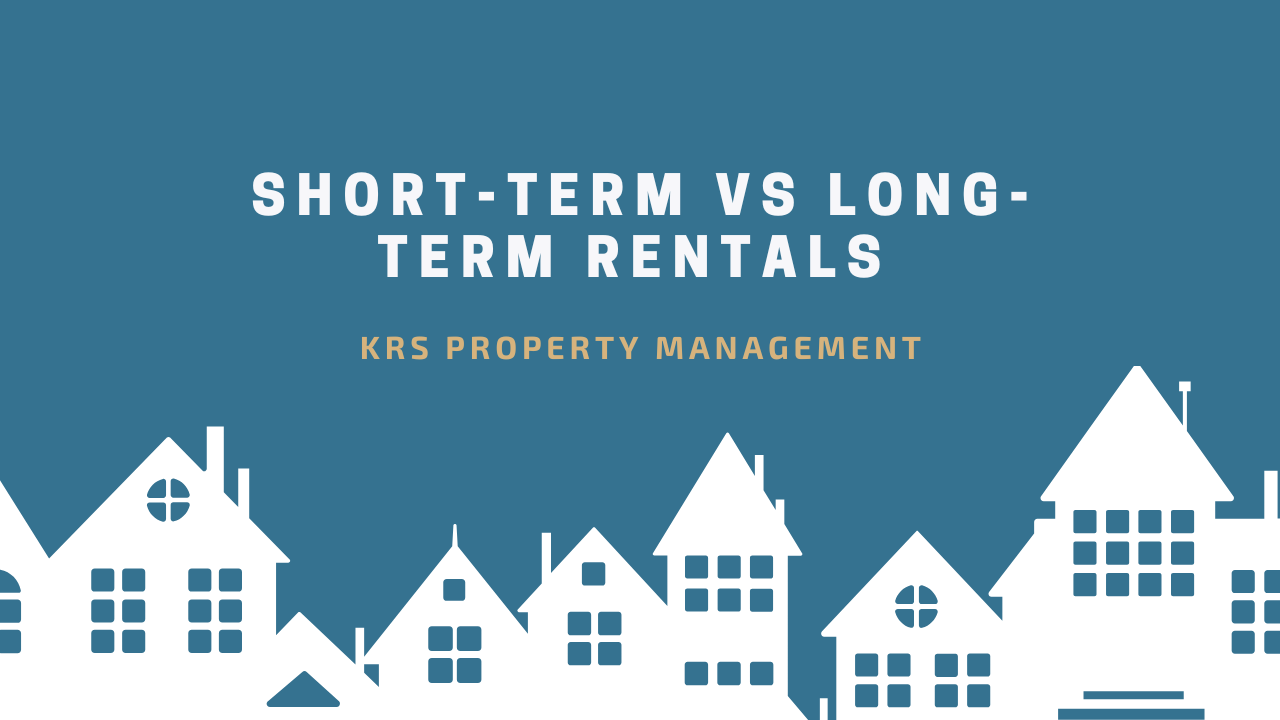
Key Takeaways
Long-term rentals offer predictable income, lower effort, and tenant stability.
Short-term rentals provide flexibility, higher earning potential, and faster turnover.
Partnering with a property management company like KRS Holdings simplifies operations and maximizes profitability.
For property owners in the Richmond area, one of the biggest decisions is how to rent out a property: for a few nights at a time or for several months or years. Both options can generate strong returns, but they operate very differently.
Short term rentals move fast, offer flexibility, and can bring higher rewards. Long term rentals provide stability, predictable income, and less turnover.
At KRS Holdings, we help Richmond landlords find the approach that fits their property, market, and management style.
Understanding the benefits and challenges of each option will help you choose the best path to meet your goals.
Long-Term Rentals
What It Is
A long-term rental usually runs six months or longer, appealing to tenants who crave stability, such as professionals relocating for work, families setting roots, or students completing a degree.
For landlords, it is the slow and steady route. You can expect consistent rent payments, fewer turnovers, and less day-to-day involvement.
Most long-term units are unfurnished, which reduces wear and tear while allowing renters to
personalize the space. That sense of home encourages them to stay longer and care for it as their own.
Benefits
Long-term rentals offer a steady income stream. Multi-month leases provide predictable revenue and financial peace of mind because you know exactly when rent is due and how much is coming in.
They also reduce turnover expenses, since each move-out triggers costs like advertising, repainting, repairs, and cleaning. Tax advantages are another benefit, as owners may qualify for deductions on property taxes, insurance, mortgage interest, and maintenance, improving the bottom line.

Tenant stability is another positive factor. Renters who stay long-term tend to integrate into the neighborhood, build relationships, and report issues early, protecting both the property and your reputation.
Drawbacks
Long-term rentals reduce flexibility. Once the lease is signed, you cannot reclaim the space or adjust pricing until renewal.
Monthly earnings may be lower compared to nightly rates in tourist-heavy areas, and lease
agreements carry commitment risks. If the tenant’s circumstances change or repairs arise, you are responsible for navigating the terms carefully.
Learn More About Our Property Management Services
Ideal For
Long-term rentals are ideal for investors who value predictable income, minimal management, and see real estate as a long game.
Short-Term Rentals
What It Is
Short-term rentals operate at the other end of the spectrum, driven by travel, convenience, and speed. These properties cater to tourists, business travelers, and digital nomads who prefer fully furnished homes over hotels.
Here, you are not just leasing a space but running a small-scale hospitality business. Guests expect Wi-Fi, clean linens, stocked kitchens, and prompt communication. When done right, the rewards can be substantial.
Benefits
Short-term rentals offer flexible scheduling. You decide when the property is available and can block it off for personal use or family vacations without giving up annual income.
They also provide higher earning potential. In busy markets, nightly rates can multiply your yearly yield compared to a fixed long-term lease, and even short bookings can add up quickly during peak season.

Short-term rentals attract a broader tenant base, from relocating professionals to couples on weekend getaways, all of whom value move-in-ready spaces. Shorter commitments allow tenants to come and go within days or weeks, giving you the freedom to adjust pricing, test amenities, or switch to long-term leasing later.
Drawbacks
Income can be volatile, rising during tourist months and dropping in off-seasons, which can
make budgeting more challenging. Higher upkeep costs are another factor, as constant turnover requires frequent cleaning, restocking, and maintenance, and furniture and appliances wear faster.
Short-term rentals can also be time-intensive, with managing bookings, guest communication, and reviews potentially becoming a second job unless you hire help. Regulatory challenges are another consideration, since many cities restrict short-term stays or require special permits.
Ideal For
Short-term rentals are best for owners in tourism-driven or urban markets who want flexibility, higher yields, and do not mind a more hands-on management style.
Key Factors to Weigh Before Deciding
Before choosing between long-term and short-term rentals, consider several important factors. First, market demand: does your area attract visitors year-round, or is it geared toward long-term residents? Beach towns, city centers, and university hubs each behave differently.
Property type is another consideration. A compact condo near downtown may excel as a
short-term rental, while a three-bedroom suburban home might appeal more to long-term renters.
Projected returns should be calculated carefully, factoring in cleaning, maintenance, utilities, and vacancy rates, because gross earnings rarely tell the full story.
Local regulations are critical, as short-term rental laws can change quickly, so licensing requirements, taxes, and homeowners association rules must be reviewed.

Finally, consider your time and involvement. Ask yourself whether you want a passive investment or an active business. Long-term rentals can run on autopilot, while short-term rentals demand constant attention.
Evaluating Opportunities Like a Pro
Even seasoned investors rely on data and diligence. Study competing listings to benchmark rent and amenities, screen tenants carefully, check the credit history for long-term renters, and perform platform vetting for short-term guests.
Calculate ROI conservatively, including repairs, management fees, and downtime between leases.
A property management partner can simplify this process by tracking metrics, pricing dynamically, and ensuring compliance, allowing you to focus on scaling your portfolio.
Blending Both Models: The Hybrid Approach
Some landlords find success by merging both strategies, renting long-term during the school year and switching to short-term during holidays or peak travel seasons.
This hybrid model helps maximize occupancy while offering flexibility, but it requires more organization and familiarity with local regulations. A management firm can design a leasing calendar that keeps the property profitable year-round.
Bottom Line
Both short-term and long-term rentals can be profitable, but they suit different types of investors. Long-term rentals are ideal if you value predictability, minimal day-to-day involvement, and steady returns.
Short-term rentals are a better fit if you seek flexibility, higher earning potential, and do not mind the extra effort involved in managing bookings and guests. The key to success is not choosing
the “better” option, but selecting the strategy that aligns with your goals, market, and lifestyle.
Partnering with a professional property management company, like KRS Holdings, can make either approach easier to manage by handling tenant screening, maintenance, marketing, and compliance, so you can enjoy the rewards without the stress.






